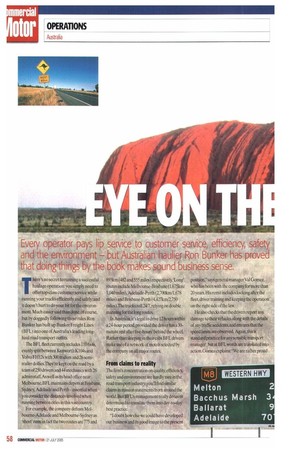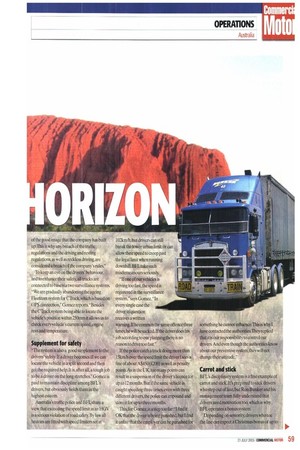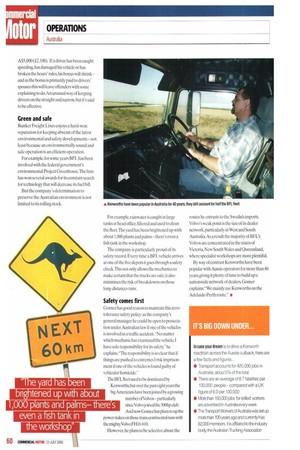Every operator pays lip service to customer service, efficiency, safety
Page 58

Page 59

Page 60

If you've noticed an error in this article please click here to report it so we can fix it.
and the environment — but Australian haulier Ron Bunker has proved that doing things by the book makes sound business sense.
There's no secret to running a successful haulage operation: you simply need to offer top-class customer service while running your trucks efficiently and safely; and it doesn't hurt to do your bit for the environment. Much easier said than done, of course, but by doggedly following those rules Ron Bunker has built up Bunker Freight Lines (BFL) into one of Australia's leading longhaul road transport outfits.
The BFL fleet currently includes 1106x4s, evenly split between Kenworth K104s and Volvo FH12s with 300 trailers and 26 semitrailer dollies,They're kept on the road by a team of 250 drivers and 44 mechanics with 26 admin staff As well as its head office near Melbourne. BFL maintains depots at Brisbane, Sydney, Adelaide and Perth — essential when you consider the distances involved when running between cities in this vast country.
For example, the company defines Melbourne-Adelaide and Melbourne-Sydney as 'short' runs:in fact the two routes are 775 and 893km (482 and 555 miles) respectively.`Long' routes include Melbourne-Brisbane (1,675km/ 1,040 miles), Adelaide-Perth (2,700km/1,678 miles) and Brisbane-Perth (4,427km/2,750 rniles).The trucks roll 24/7, relying on double manning for the long routes.
In Australia, its legal to drive 12 hours within a 24-hour period,provided the driver has a 30minute rest after five-hours' behind the wheeL Rather than sleeping in their cabs BFL drivers make use of a network of motels selected by the company on all major routes.
From claims to reality
The firm's concentration on quality, efficiency, safety and environment are hardly rare in the road transport industry;you'll find similar claims in mission statements from around the world. But BFL's management really do seem determined to translate them into day-to-day best practice.
"I doubt how else we could have developed our business and its good image to the present position." says general manager Val Gomez, who has been with the company for more than 20 years. His remit includes looking after the fleet.driver training and keeping the operation on the right side of the law.
He also checks that the drivers report any damage to their vehicles along with the details of any traffic accidents, and ensures that the speed limits are observed. Again, this is standard practice for any sensible transport manager ,but at BFL words are translated into action. Gomez explains: -We are rather proud of the good image that the company has built up.This is why any breach of the traffic regulations and the driving and resting regulations, as well as reckless driving,are considered a breach of the company's rules."
To keep an eye on the drivers' behaviour, and to enhance their safety, nil trucks are connected to base via two surv eillance systems. We are gradually abandoning the ageing Heetcom system for CTrack, which is based on (3PS connection," Gomez reports. -Besides the CTrack system being able to locate the vehicle's position within 250mm it allows us to check every vehicle's current speed,engine revs and temperature.
Supplement for safety
"The system is also a good supplement to the drivers' safety. If a driver becomes ill we can locate the vehicle in a split second and then get the required help. It is, after all, a tough job to be a driver on the long stretches." Gomez is paid to maintain discipline among BFL's drivers, but obviously holds them in the highest esteem.
Australia's traffic police and BFL share a view that exceeding the speed limit in an HGV is a serious violation of road safety. By law all heavies are fitted with speed limiters set at 102km/h, but drivers can still break the lower urban litnit,or can allow their speed to creep past the legal limit when running downhill.BFL take such misdemeanours seriously.
"If one of our vehicles is driving too fast, the speed is registered in the surveillance system." says Gomez. "In every single case the driver in question receives a written warning. If he commits the same offence three times, he will be sacked. If the driver does his job according to our planning there is no reason to drive too fast."
If the police catch a truck doing more than 15krrilh over the speed limit the driver faces a fine of about A$450 (i200) as well as penalty points. As in the UK, too many points can result in a suspension of the driver's licence for up to 12 months. But if the same vehicle is caught speeding three times,even with three different drivers, the police can impound and store it for up to three months.
This,for Gornez,is a step too far:"I find it OK that the driver is being punished, but I find it unfair that the employer can be punished for something he cannot influence.This is why I have contacted the authorities.They replied that it is our responsibility to control our drivers. And even though the authorities know about our preventive system, they will not change their attitude."
Carrot and stick
BFL's disciplinary system is a fine example of can-at and stick. It's prepared to sack drivers who step out of line, but Ron Bunker and his management team fully understand that drivers need motivation too, which is why BFL operates a bonus system.
Depending on seniority, drivers who toe the line can expect a Christmas bon us of up to A$.5,000 (f2,100). If a driver has been caught speeding, has damaged his vehicle or has broken the hours' rules, his bonus will shrink — and as the bonus is primarily paid to drivers' spouses this will leave offenders with some explaining to do. An unusual way of keeping drivers on the straight and narrow,but it's said to be effective.
Green and safe
Bunker Freight Lines enjoys a hard-won reputation for keeping abreast of the latest environmental and safety developments — not least because an environmentally sound and safe operation is an efficient operation.
For example, for some years BR_ has been involved with the federal government's environmental Project Greenhouse.The firm has won several awards for its constant search for technology that will decrease its fuel bill.
But the company's determination to preserve the Australian environment is not limited to its rolling stock. For example, rainwater is caught in large tanks at head office, filtered and used to clean the fleet.The yard has been brightened up with about 1,000 plants and palms — there's even a fish tank in the workshop.
The company is particularly proud of its safety record. Every time a BFL vehicle arrives at one of the five depots it goes through a safety cheek.This not only allows the mechanics to make certain that the trucks are safe; it also minimises the risk of breakdowns on those long-distances runs.
Safety comes first
Gomez has good reason to maintain this zerotolerance safety policy: as the company's general manager he could be open to prosecution under Australian law if one of the vehicles is involved in a traffic accident ."No matter which mechanic has examined the vehicle, have sole responsibility for its safety," he explains. The responsibility is so clear that if things are pushed to extremes I risk imprisonment if one of the vehicles is found guilty of vehicular homicide."
The BFL fleet used to be dominated by Kenworths, but over the past eight years the big Americans have been joined by a growing number ofVolvos —particularly since Volvo joined the 500hp club. And now Gomez has plans to up the power stakes on those trans-continental runs with the mighty Volvo FH16 610.
However,he plans to be selective about the routes he entrusts to the Swedish imports Volvo's weak point is the size of its dealer network, particularly in West and South Australia. As a result the majority of BFL's Volvos are concentrated in the states of Victoria,New South Wales and Queensland, where specialist workshops are more plentiful.
By way of contrast Kenworths have been popular with Aussie operators for more than 40 years, giving it plenty of time to build up a nationwide network of dealers. Gomez explains:"We mainly use Kenworths on the Adelaide-Perth route." •


































































































































































































